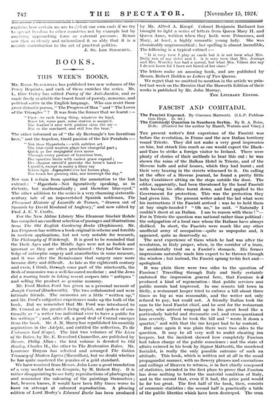BOOKS.
THIS WEEK'S BOOKS.
MR. BASIL BLACKWELL has published two new volumes of the Percy Reprints, and each of them enriches the series. Mr. L. Rice Oxley has edited Poetry of the Anti-Jacobin, and so made freely available the truest fount of parody, nonsense, and political satire in the English language. Who can resist those great didactic poems, " The Progress of Man " and " The Loves of the Triangles " ? It was from the former that we learnt : - " First—to each living thing, whate'er its kind, Some lot, some part, some- station is assign'd. The feather'd race with pinions skim the air-- Nut so the rnackarel, and still less the bear."
The other informed us of " the sly Rectangle's too licentious love," and the hopeless, timid passion of the fair Parabola :— " Not thus Hyperbola, :—with subtlest art The blue-eyed wanton plays her changeful part ; Quick as her conjugated axes move Through every posture of luxurious love, Her sportive limbs with easiest grace expand ; Her charms =wird provoke the lover's hand :— thivoil'd, except in many a filmy ray Where light Asymptotes o'er her bosom play, Nor touch her glowing skin, nor intercept the day."
Nor can I refrain from quoting the annotation to the last extract : Hyperbola—Not figuratively speaking, as in rhetoric, but mathematically ; and therefore blue-eyed." The other addition to the series is a very charming sixteenth- century tale of an impoverished Spanish nobleman, The Plcasaunt Historic of Lazarillo de Tomes, " drawen out of Spanish by David Rouland of Anglesey," and now edited by Prof. J. E. V. Crofts.
For the New Aldine Library Miss Eleanour Sinclair Rohde has compiled an excellent selection of passages and illustrations from The Old English Gardening Books (Hopkinson). Mr. lan Ferguson has written a book original in scheme and forcible in modern applications, but not very notable for research, The Philosophy of Witchcraft. It is good to be reminded that the Dark Ages and the Middle Ages were not as foolish and ignorant as they are often proclaimed : they had the know- ledge of antiseptic surgery and anaesthetics in some measure, and it was after the Renaissance that surgery once more became dirty and diflicult. As late as the eighteenth century and even, I think, through some part of the nineteenth, the flesh of mummies was a well-favoured medicine ; and the Jews did a roaring trade in faking recent corpses into " antiques " and selling the product as genuine mummy.
Mr. Ford Madox Ford has given us a personal memoir of Joseph Conrad (Duckworth). The two collaborated and were intimate friends. The memories are a little " written up," and Mr. Ford's subjective experiences make up the bulk of the book. But we remember that Mr. Ford was introduced to Mr. Conrad as the greatest living stylist, and spoken of con- tinually as " a writer too individual ever to have a public for his writings " ; and, after all, a good deal of Conrad emerges from the book. Mr. J. M. Murry has republished his monthly aspirations in the Adelphi, and entitled the collection, To the Unknown God (Cape). The first two volumes of The Lives of the Rakes, by Mr. E. Beresford Chancellor, are published by Messrs. Philip Allan : the first volume is devoted to Old Rowley, Charles. II., the other to The Restoration Rakes. Mr.
Laurence Binyon has selected and arranged The Golden Treasury of Modern Lyrics (Macmillan), but we doubt whether he has quite mastered the puzzles of a gold standard.
We have received from Messrs. John Lane a good translation of a very useful book on Gauguin, by M. Robert Rey. It is rather disappointing to see forty reproductions of photographs and remember the colouring of the paintings themselves ; but,' heaven • knows; it -wctuld " have faecal fifty times worse to have m2- attempt at -coloure-d reproduction. A pleasing edition of Lord Morley's Edmund Burke has been produced by Mr, Alfred A. Knopf. Colonel Benjamin Bathurst has brought to light a series of letters from Queen Mary II. and Queen Anne, written when they both were Princesses, and Mary, at least, a highly romantic young lady. She was abominably ungrammatical ; her spelling is almost incredible. The following is a typical extract :- " It is very trew I play at cards but it is not trew what Mrs. Dolly sais of my sister and I. it is very trew that Mrs. Jenings and Mrs. Wortley has had a queral, but what Mrs. Viliers dos say I do not know for I have not hared of her since."
The letters make an amusing book, and are published by Messrs. Robert Holden as Letters of Two Queens.
We regret that we omitted to mention in the article we prin- ted last week on the Brontes that the Haworth Edition of their works is published by Mr. John Murray.
THE LITERARY EDITOR.










































 Previous page
Previous page